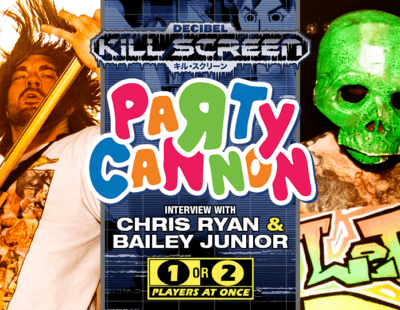
Photo: Ester Segarra
On this very site in October 2016, former Celtic Frost frontman Tom Gabriel Fischer announced that four career-defining Frost albums—Vanity / Nemesis, Into the Pandemonium, the Decibel Hall of Fame-inducted To Mega Therion and the Decibel Hall of Fame-inducted Morbid Tales—would be reissued in 2017. The band’s former label, Noise Records, had recently been sold to BMG and the media company soon began resurrecting the famed underground metal brand through a series of lavish reissues, including seminal titles from Kreator and Voivod.
At the time of the announcement, Fischer was directly cooperating with BMG, contributing vintage photos, painstakingly remastering the music and penning extensive liner notes for each of the four Frost reissues. It’s with the latter, however, that problems arose. BMG would not approve Fischer’s brutally honest account of the band’s relationship with Noise—particularly with label founder Karl-Ulrich Walterbach. Unwilling to accept BMG’s lengthy edits, Fischer pulled his liner notes entirely and divested himself from any association with the project. Decibel spoke with Fischer in early July shortly after the records’ re-release and the artist often known as Tom Gabriel Warrior made one thing abundantly clear: “I definitely do not endorse these reissues.”
I’ve read your personal blog posts on the struggles with the reissue liner notes, but for those who haven’t, can you explain where the troubles began?
Well, the struggles with the liner notes should have begun a year ago. I wrote dedicated liner notes for every individual album and I handed them to BMG/Noise Records in early fall of 2016. I basically expected them to come back to me immediately. I fully expected them to object to them, because, of course, the story of these albums is incomplete if you do not mention the, at times, conflicts between the original Noise Records in the 1980s with the band—especially with the Into the Pandemonium album. It is an integral part of the history of the album and it is the reason why the album sounds the way it does.
So, of course, in the liner notes, there was a reasonable amount of details—we’re not talking about a book here, we’re talking about liner notes, which is like two pages in a CD booklet. I expected them to object to that immediately because it’s not my first day in the music industry, but to my astonishment, nothing came back. So, we kept on working on these reissues. We designed everything with my liner notes in them. The materials circulated back and forth countless times and I thought, “Well, they must have seen it; they must have read it.” But only at the beginning of 2017 I received a mail from their legal department and they said that they’ve been given the almost-finished materials and they have seen that there is some history in there that is not entirely unproblematic. They submitted to me, censored versions—so called “red line versions.” In the case of the Into the Pandemonium album, the censored versions would have left maybe one-third of what I wrote and it would have been completely disjointed. Nothing would have made sense and the history wouldn’t have been accurate anymore. Of course, I said, there is no way in hell that I will be censored and that is how the end of my involvement with these reissues began.
I particularly enjoyed your proposed Into the Pandemonium liner notes revisions where you wrote, “to this day we feel limitless gratitude to the label and a virtually god-like reverence for the label’s founder.” I think your sarcasm and gallows humor is sometimes lost on people.
[Laughs] It’s deeply sarcastic, of course; it’s very evil. But I seriously proposed it to them. I said, “before I will agree to a censorship, which will never happen, I will propose this to you. Either go with my original ones, or go with my new ones, but there is nothing in between.” The entertainment factor in the whole procedure wasn’t lost on me. I’ve been doing this for 35 years and I’ve been around the block when it comes to record companies, not least because of what happened in the 1980s between Noise Records and Celtic Frost. This was my initiation in record company politics and not a tame one at that. So, I’ve known all of this for most of career, and, as I said, I expected them to object—I was just surprised that they found out so late. Even though I didn’t write any swear words, I didn’t make any accusations—I really stuck to the facts of how these albums came about. But if you work in a legal department and you wanna mitigate any threats of lawsuits, of course you object to that. I understand that. Every step of the way, everything went very civilized. But as a musician, who this year turns 54, as one of the originators of extreme metal—as people always tell me—there’s no way in hell that I’m gonna be censored. Either we stick to the truth, or my cooperation is hereby terminated.

I’m surprised by the objection on BMG’s part. The frayed relationship between you and Noise isn’t breaking news. And this doesn’t negatively impact the Noise brand in any way, since, to my understanding, Noise will remain a legacy label and not sign and release new music from other bands.
I agree with you. Everybody has said the same thing. Nobody understands why they became so scared. Not only has the story of Celtic Frost and Noise been detailed in my first book, which came out in 2000, but we also detailed it in the 1980s in countless interviews. And other bands on Noise like Kreator and Helloween also have similar stories. There have been so many accounts about the discrepancies of opinion between Noise and their bands that it all is common knowledge by now. It doesn’t take away from the history of Noise. In spite of those conflicts, whether you like it or not, Noise was a pioneer in discovering these bands. And a lot of these bands—including us—wouldn’t have had the same career without them. Like you say, it’s simply a part of the reality. It’s old news.
What I didn’t know at the time, was that the former owner of Noise Records, Karl-Ulrich Walterbach, the guy who formed Noise Records, has been in quite close cooperation with BMG, as I understand it, in resurrecting the Noise name. I think they were scared of him being offended by this and maybe suing them for publishing something that tarnishes his name. I have witnessed in recent years that [in] the interviews that Karl-Ulrich Walterbach is issuing, he’s pursuing something akin to a whitewashing of his own name. I think over the decades he’s grown tired of seeing his name in connection with all of these conflicts and he would rather be recognized as the pioneer who discovered all of these bands before everyone else did. And that all plays into this topic.
Have you read David E. Gehike’s Noise Records’ history book, Damn the Machine?
No, I haven’t. I participated in it and they wanted to send it to me, but I didn’t send my address, because I’ve already lived through that. I’m getting sick and tired of the whole Noise story. I’d basically like this whole thing to be about the music with the book and the reissues.
Noise’s Celtic Frost reissues from 1999 lacked liner notes. Did you face similar issues with label censorship back then and were you more interested in telling the stories via your 2000 book Are You Morbid?, which you were likely writing at the time?
There are in fact liner notes in the 1999 reissues. [Tom is correct. They’re printed in all-caps and run across one column the length of a page. And for 18 years, I’ve flipped past them assuming they were an album thanks list!—ed] They’re quite a bit shorter than what I submitted this time around, but there are individual liner notes for every album. And, as far as I remember, they also go into the conflicts between Noise Records and the band. And absurdly, the records were reissued by Noise with my liner notes. And now that it’s being reissued by another label, the other label is scared. That’s quite remarkable.
Let’s talk about the remastering process. You did this with your Triptykon bandmate V Santura. To both your credit, they sound massive compared to the 1999 versions. Where you completely satisfied with this part of the reissue experience?
Yes, this was something I actually wasn’t satisfied with in 1999 due to the possibilities we had then and with the access to source material, which was very flawed at the time. And my own proficiency in the studio as a producer back then was not what it is now 17 years later because you always learn things. [In 1999] I came out rather dissatisfied. It was an improvement over the originals as there were a million flaws—there were tape drop-outs from the 1980s, for example. This was a main point that I wanted to address this time around. We spent a very detailed week-long session. V Santura, the guitarist of Triptykon and I, in his studio remastering these reissues in the utmost detail. To me, they’re the best-sounding Celtic Frost releases ever. I don’t think you can make Celtic Frost sound any better and any more complete. We really tried to address every flaw that was part of the 1980s’ recording process. And I have to qualify this in that, of course, we didn’t alter the sound. To me, that sound is sacred. I would never touch that. I’m talking more about technical flaws like drop-outs on one channel and things like that, which, of course, happened in the 1980s with tape. So, we were able to basically bring these recordings back to the way they sounded immediately after the band had recorded them.
 Celtic Frost, September 1985. Photo: Ernst Wirz
Celtic Frost, September 1985. Photo: Ernst Wirz
Was there a temptation to take the George Lucas route of revisionism at any point in that process?
No, not for me. I’ve been highly critical about people who revise history—it doesn’t just concern liner notes. There have been, for example, many bands who have re-recorded their early albums because these albums had an imperfect sound and so on. I’ve never ever subscribed to that. To me, the material of that time has a certain charm and it works because it’s imperfect. I would never ever touch the sound or anything like that—never.
The songs of Celtic Frost will live on forever, at least for as long as you continue to perform the songs with Triptykon, but how would you like to have these four albums that have been reissued remembered?
I cannot answer that question because I don’t think like that. It would be extremely preposterous if I had some demands on how these records should be remembered. I have absolutely no opinion on that and I’m being absolutely honest with you. I feel extremely fortunate that I’ve been a part of these albums, that I even had a chance to do this coming from this very modest background, and difficult youth as everybody knows. I feel extremely fortunate that I even had this career. And when I’m out with Triptykon and we’re playing somewhere like we just did at Tuska [Open Air Metal Festival in Finland], Celtic Frost is always present in the questions of the audience, in the questions of journalists. I feel extremely lucky about this. I don’t think I need to have any demands or whatever. I’m just very grateful. And for me personally, these are my songs and many of these songs represent a particular point in my life or a particular story that is very important for me and that is why we are still playing them.
You recently agreed to release two more books through our mutual friend Ian Christe at Bazillion Points. Can you talk about those and any tentative timelines for those projects?
It’s gonna be a very tentative timeline. Because it’s not just a manuscript you’re talking about, but also the design and the incorporation of uncounted photos and so on, which takes some time. I would very much like the first of these two books to come out sometime next year. I don’t know if I can do that because I’m also working on a new [Triptykon] album and perhaps on a side project, but I’ll try my best. I don’t want to be 70 by the time these books will come out, because I am fairly sure I won’t reach that age. They should come out while I’m still alive and I will try my best to do that. I enjoy very much creating books together with Ian of Bazillion Points. He’s the perfect partner for such a venture. I’ve been very, very fortunate to have him as a publisher, so the process of creating a book with him… it’s a work-intensive process but it’s amazing fun. I’m looking forward very much to completing the next book as soon as possible with him.
The results with Only Death Is Real, in particular, speak for themselves, I think. Ian is the man when it comes to publishing books like this. [Full disclosure: Bazillion Points released a revised and expanded edition of my book, Choosing Death, in 2016—ed]
Absolutely, when I had the Only Death is Real book ready, I talked to other publishers and there was a quite well-known publisher who wanted me to cut 60 pages from the book and dump hundreds of photos, and he said “Nobody’s interested in that. It’s too long.” whereas Ian said, “Let’s add some material,” and you know the result. The book is still in print years after it was released, so I’m very happy that I found him.
I’m unclear on this; is one of the books a reimagining or revised edition of Are You Morbid?
Yes, it’s a very expanded book because I have much more material and much more photos. It’s a completely reworked and expanded version of Are You Morbid? and we’ll see how expensive the manuscript is and how much we can cram into this one book. I personally think because of the wealth of material, the second book after Only Death Is Real will go up to the conclusion of Celtic Frost—the first termination of Celtic Frost—and then likely the third book will start when we reform Celtic Frost and up to the present day with Triptykon, just due to the wealth of material available.
You wrote Are You Morbid? in the late ’90s. As a writer, almost two decades in between what you wrote then and what you decided to revise and expand, what has that experience been like for you when you went over the manuscript? Are you satisfied with things as they were, are you a different kind of writer now?
I think I’m a very different kind of writer. You have to consider that my first book came out in 2000 but the actual manuscript was written in 1992, which makes it 25 years old. Of course, I hopefully have matured and I’m a better writer, and I have much more experience in any aspect of my life. I’m in control of my career, I have my own record company, so, of course, that alters your vision. And yes, I do feel very dissatisfied with the original manuscript that I wrote when I was a much younger self. I didn’t have so much insight, my English wasn’t as good, I didn’t understand many things that only revealed themselves to me later, so I think I will be able to provide a much better book nowadays as a slightly older adult.
In the interest of bringing this interview full circle, those pulled liner notes from these reissues—will material from those potentially be resurfacing in this new version of Are You Morbid?
I’ve been asked this many times, and I have to say: this is a mistaken train of thought. You have to realize that the books are the complete story. The liner notes are just a condensed version for publication in a booklet. So, if you get the book, you of course get the far more detailed version of everything than you will get in the liner notes, so it doesn’t make any sense for me to include the liner notes in a book, which details the entire same story.
No, I’m not talking verbatim.
Of course, that’s what the book is all about. Those stories that I condensed on two pages for a booklet. That’s what hundreds of pages in the book are about; the existence of Celtic Frost and the creation of these albums with all the positive and negative events that accompanied them. That’s what it’s all about, what else should I write? What we ate?
You could save that for your Instagram profile. I think that’s what people are into these days.
[Laughs] That’s actually very true.





